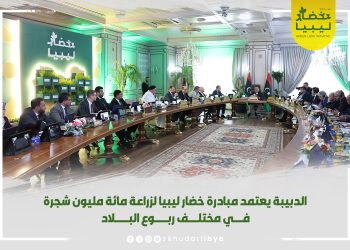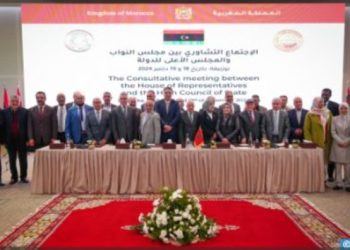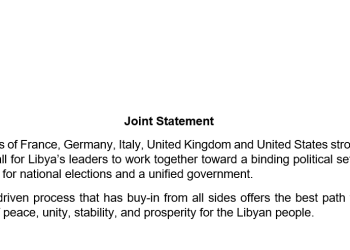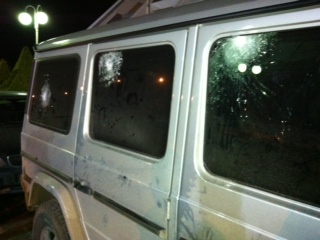By Rzszard Bouvier.
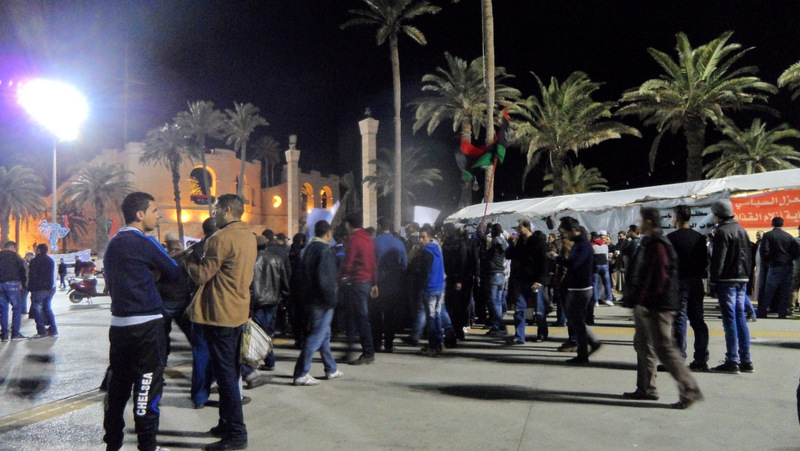
Tripoli, 12 January 2013:
Some 100 young men, mostly from the Tripoli’s Fashloum and Suq Al-Juma districts, gathered on Martyrs’ Square . . .[restrict]on Friday evening to protest at recent events in their neighbourhoods. Fellow demonstrators were reported to have gathered in other parts of the capital.
Earlier in the past week, Fashloum has been the scene of deadly clashes between the SSC-associated Nawasi Brigade and local residents supported by some other brigades. Events culminated in angry protesters trying to storm Nawasi’s headquarters at Mitiga Airport on Thursday afternoon.
At least six people are reporetd to have been killed in the course of several days of clashes. Their families and friends say they hold the Nawasi Brigade responsible for the deaths and have called on the government to take control and bring the culprits to justice.
The brigade is part of the Special Support Forces (farqa al-asnad al-khasa) of the Supreme Security Committee (SSC), and although invariably known by the name of Nawasi has also been referred to as a Deterrence Brigade (katibat al-rad‘a). Lead by commander Abdel-Raouf Al-Karah, it is considered radical in its religious outlook and in its actions.
The trouble began last Sunday, when Nawasi members are alleged to have seized and tortured a man from Fashloum they suspected of drug dealing. The man, identified as Najmi Ibrahim Al-Abani, later died in a secret detention centre said to be located in Ain Zara.
Karah has denied the allegations. In an interview with Libyan TV on Thursday, he said that the prisoner died of cold as he was kept outdoors, a statement that has been widely derided by his opponents.
When news of the man’s death emerged, young fighters from Fashloum took to the streets on Wednesday, blocking roads and denouncing what they claimed was officially sanctioned vigilante justice carried out by radicals backed by the SSC. Armed youth, who did not appear to be under the command of any known brigade or security force, occupied major intersections, causing traffic chaos in parts of the capital.
Ensuing confrontations cost the lives of at least five other people, three of whom are said to have died on Wednesday and two the following day. Several others were injured. Among the casualties were an elderly man and several teenagers. One, a 16-year old boy had been shot in the leg, protestors claimed. Others, they alleged, were being held and tortured in Nawasi’s detention centre.
Several of the demonstrators in Martyrs’ Square identified themselves as family members of those who had died and their distress left little doubt as to their feelings about the incidents.They showed on their mobile phones videos of corpses and severe injuries. Videos and images had already been circulating on the internet.
It was clear that this was much more serious than a simple neighbourhood quarrel.
Nawasi has been active for some time, raiding areas of the capital and arresting those they suspect of drinking alcohol, taking drugs, dealing in such illegal substances or being involved in other “deviant behaviour”. The brigade claimed Najmi Al-Abani was among “the most notorious drug dealers in North Africa” and had been searched for since 1995.
Last month, the brigade stormed a party in Ain Zara and seized 12 men they accused of homosexuality. The men were later said to have been released, however it is now reported that they are still being held.
The protesters in Martyrs’ Square demanded that Nawasi be dissolved and some of its members put on trial.
Proclaiming Allahu Akbar and “the murderer [shall be] killed” (al-qatil yuqtal), their anger was evident. “They dare accuse us of being criminals and former regime loyalists”, one protestor shouted. “They didn’t even fight in the revolution! They just sat on chairs and let their beards grow.” Others claimed that Karah was previously unknown and that he had no valid credentials.
“They want to impose their order on us, but we want them out”, another demonstrator shouted.
The protestors warned that there would be trouble if the army did not intervene and arrest those in brigade they claimed were responsible for the clashes and deaths. “This time we protested peacefully, but if nothing is done we will bring our arms next time”, they threatened.
However, if throughout Fashloum and some other nearby areas of the capital there is deep hostility to Karah and Nawasi at the moment, that is not the case elsewhere in the capital.
Many in Tripoli, and even some in Fashloum itself, strongly support Karah and welcome the fact that someone is trying to stem the flourishing black market and rising crime rate. As reported earlier in the week, murders have risen by around 500 percent over the past two years.
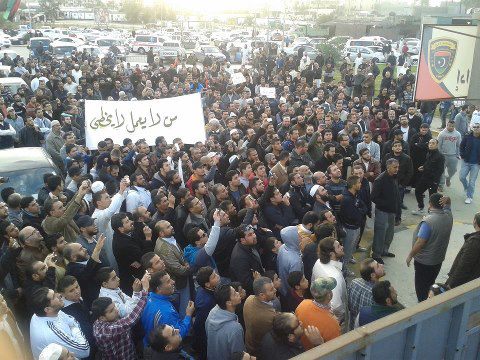
That was also evident on Friday. While 100 Fashloum residents demonstrated in Martyrs’ Square, a crowd of several hundred gathered at the entrance to Mitiga Airport in support of Nawasi and its campaign. “The one who does not work makes no mistakes”, read one of the posters held up, implying that unlawful means may sometimes be necessary to fight a greater evil.
The only thing that seems certain is that there are now deep divisions between the two sides.
[/restrict]





